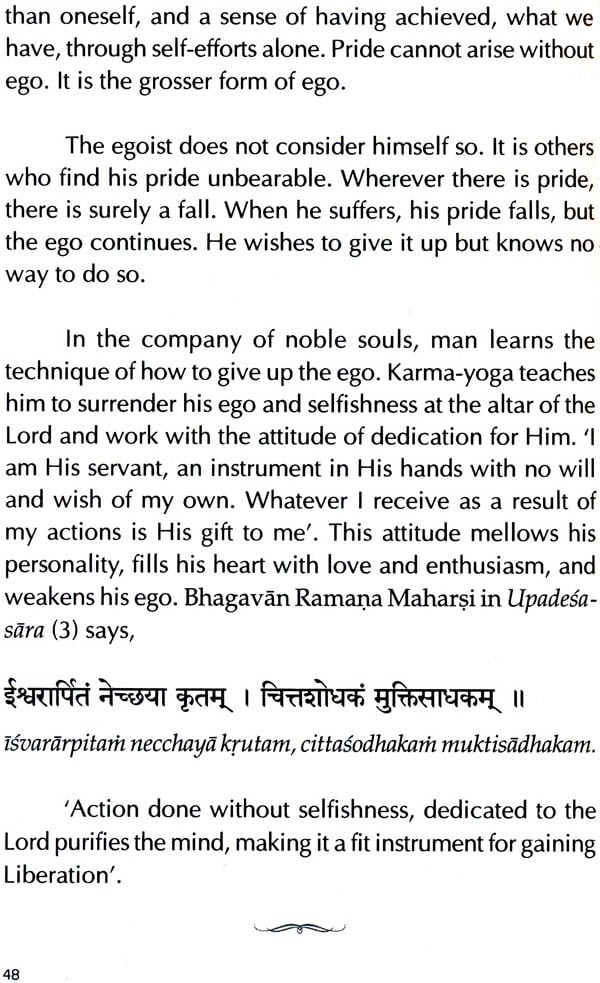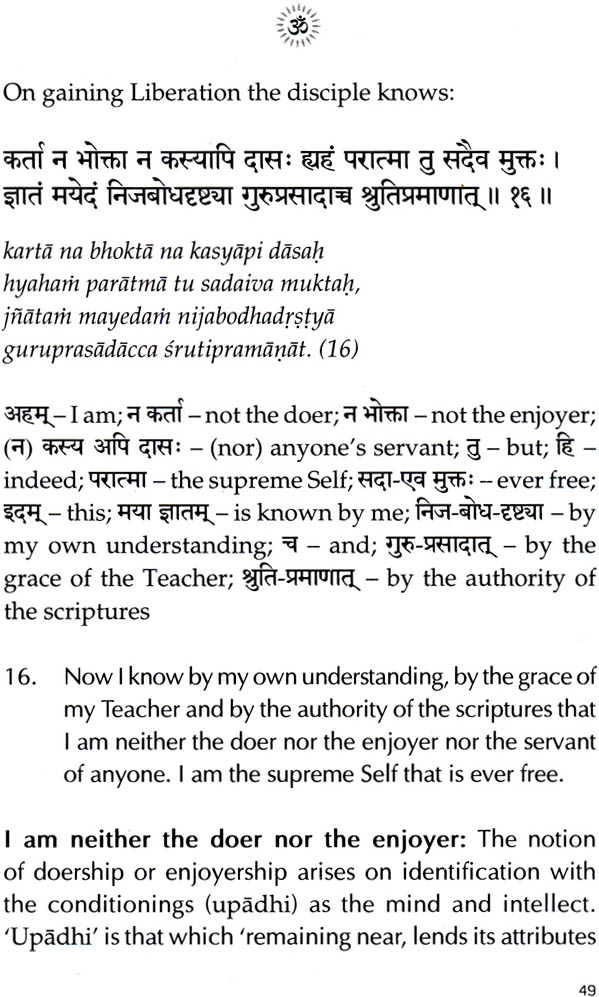
Jnanasara (The Essence of Knowledge) (Sanskrit Text with Transliteration and English Translation)
Book Specification
| Item Code: | NAF202 |
| Author: | Swami Tejomayananda |
| Publisher: | Central Chinmaya Mission Trust |
| Language: | Sanskrit Text with Transliteration and English Translation |
| Edition: | 2012 |
| ISBN: | 9788175975040 |
| Pages: | 58 |
| Cover: | Paperback |
| Other Details | 7.5 inch X 5.0 inc |
| Weight | 80 gm |
Book Description
‘I’ am the essence of ‘my’ life. Without Knowing ‘I’, the knower, the very basis of all knowledge, how can I be truly knowledgeable ? Jnanasara unfolds the path of Knowledge which leads to the Knower, the essence of all knowledge.
Swami Tejomayananda’s lovely composition and commentary opens up subtle vistas of thinking which dawns into an exhilarating Self-realisation.
Pujya Guruji Swami Tejomayananda is an outstanding teacher of Vedanta, with a profound depth beneath his simplicity and humility. He has a simple conviction - to fortify, strengthen and actualise the vision of his Guru, Pujya Swami Chinmayananda.
Guruji has written commentaries on many Vedantic texts. He has authored many original compositions on Vedanta and Bhakti(Devotion) and books on various other relevant topics.
He is the current head of the Chinmaya Mission - a global spiritual organisation with more than 250 centres worldwide.
This short treatise of 18 verses by Swami Tejomayananda has brought out the nectar of Upanisad mantras in a very lucid style easily comprehensible even to a casual reader. The author through reason and logic explains the basic fallacies. All sincere seekers come to enquire about the cause of multiplicity in this world, our identification with the body, our attachment to the objects of the world in pursuit of pleasure, our feeling of doership and enjoyership, what binds jivas and how to attain Liberation. This deserves serious study by all sincere sädhakas.
Diacritical marks have been used for transliteration Sanskrit and non-English words in the commentary. This will help readers to identify and pronounce the words correctly.
The English plural sign ‘s’ has been added to untranslated Sanskrit words to show that it is not elemental to the words e.g. mantras, Vedas, rsis etc.
A key to the transliteration and pronunciation has been added in the book.
In the months of May – June 1992, by the grace and blessing of Pujya Gurudev Swami Chinmayanandaji a few Sanskrit texts were composed by me. These were blessed by Pujya Gurudev during his last trip to the U.S in 1993. One of them is Jnanasara.
The ideas presented herein are not original. They are culled from the study and reflection of various texts of Vedanta. In fact none can claim originally in writing on the knowledge of Vedanta. What is generally called original is only an innovation or a new interpretation.
I hope this text will help seekers to gain a clear concept of the spiritual path and the goal.
‘Jnanasara’ means the essence (sara) of Self-Knowledge (Jnana). This can be understood further as:
1. The essence of the teachings of Upanisad: The text is written to clearly understand the sum and substance of Vedanta.
It is said, ‘as the vision so the creation’ (yatha drstih tatha srstih). The physical world is the same for all, but as our vision changes, our way of viewing life and its vicissitudes also changes. This text shows the changing vision of the seekers as he undertakes the spiritual journey to reach the ultimate goal of Self-realisation.
2. The essence of all our experiences: The essence of a thing is that, without which a thing cannot exist, as heat in fire. The world is experienced by us as thoughts in the mind. The sight of a cow or the sound ‘cow’, creates an image of a cow in our mind. Without the thought of the cow, there is no experience of a cow. For one who has no previous experience of a cow, the word ‘cow’ creates a thought, ‘I don’t know a cow’. Hence ignorance of an object is also known as a thought of the mind. So one concludes that the essence of all objects and objective knowledge is thought modification (vrtti jnana). In fact the world is seen as per our thoughts, not as it is, just as the snake is seen instead of the rope, because of the snake in our mind.
Now, what is the essence of thoughts? What is the factor without which thoughts cannot exist? They cannot exist without the Existence principle (Sat). Also ‘I’ am the essence of all thoughts. Thoughts cannot exist without me, even though ‘I’ can exist without them, as I do in deep sleep. I am of the nature of Consciousness. I am aware of the presence, absence and movement of thoughts. Hence ‘I’ , the pure Self of the nature of Existence Consciousness, is the essence of all thoughts and therefore also of the world. It is thus said, “I am the non-dual Reality form Which the world emerges and by which it is sustained and into which it emerges and by which it is sustained and into which it merges as well’. How can the waves of thoughts affect the ocean of Consciousness from which they rise? Knowing thus, man becomes free and fearless. The Purpose of this text is to shift our attention from the objects of the world to the thoughts of objects and finally to the pure Consciousness sustaining them.
3. Jnanam eva Saram: The pure Consciousness (jnana) itself is the essence of Truth. Realisation of it liberates man.







